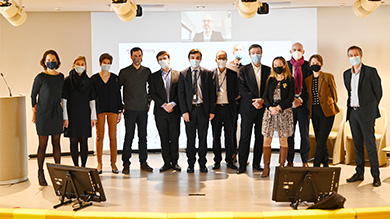During the Climate Finance Day, Chief Executive Officer Nicolas Namias underlined the active role played by Natixis in the development of green and sustainable finance.
“Sustainable finance: how to reboot the European real economy?” was the theme of the sixth edition of the Climate Finance Day held at Paris’s Palais Brongniart on October 29, 2020. The event, for which Natixis was premium sponsor for the first time, is today recognized as one of the major international events focused on climate issues. It brings together high-ranking representatives from the financial industry, regulatory authorities and governments, as well as from civil society.
Natixis’s engagement in favor of energy and ecological transition is reflected in its creation and implementation of specific financings and dedicated savings solutions.
Accelerating transition for our clients
Natixis is one of the leading players in renewable-energy financing: 90% of our financings in the electricity production industry concern renewable energies (Natixis declaration of non-financial performance (DPEF) 2019). The Bank offers clients innovative financial instruments incorporating commitments linked to environmental criteria (sustainability-linked bonds, sustainability-linked loans).
Natixis also uses the Green Weighting Factor, an innovative tool designed to accelerate the Bank’s own transition, by favoring the most climate-virtuous financings and penalizing financings entailing environmental risks. The tool also enables Natixis to anticipate regulatory changes in the green finance field.
Continuing our transition trajectory
Natixis recently strengthened its exclusion measures on sectors incompatible with energy transition.
In May 2020 we ceased financing projects devoted to the exploration and production of shale oil and gas, as well as companies active in these fields.
“We also updated our coal policy by deciding to no longer support companies developing new-coal fired power-plant capacity or thermal coal mines. We are also introducing a schedule geared to fully withdrawing from thermal coal by 2030 for EU and OECD countries and by 2040 for the rest of the world”, explains Nicolas Namias, Natixis Chief Executive Officer.
In addition, Natixis allocates capital to companies looking to develop their green activities and technologies and to high-emitting industries that are credibly engaged on transition trajectories.
Measuring the carbon footprint of portfolios
Natixis Assurances aligns its investment policy on the objectives of the 2°C trajectory set by the Paris Agreement and incorporates the carbon footprint of its investments into its ESG investment policy. This means it currently devotes close to 10% of its investments to green assets each year and is aiming for green assets to account for 10% of its total investment portfolio by 2030 at the latest.
Mirova, the sustainable investment affiliate of Natixis Investment Managers, is one of two French asset managers among the 36 companies belonging to the PRI* Leaders’ Group. This distinction confirms the firm’s status at the forefront of sustainable investment. Natixis Assurances also belongs to this group, in the institutional investors’ category.
As a recognized name in the financial industry, Natixis has committed all its business lines to the transition toward sustainable development.
*PRI: Principles for Responsible Investment. This international organization counts 2,400 signatories among institutional investors and asset managers.














